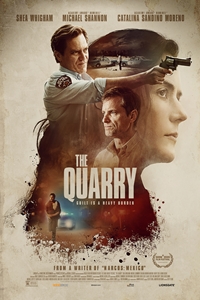The Quarry (R) ★★
 Moody and brooding, Scott Teems' The Quarry falls loosely within a genre that has been dubbed "Western noir" by some critics. Undoubtedly a serious work that attempts to address immigration tensions and personal redemption, the film suffers from a number of pitfalls. One note portrayals, skin deep characters, and a glacial pace all combine to prevent The Quarry from succeeding either as a slow-burn thriller or a message-oriented drama.
Moody and brooding, Scott Teems' The Quarry falls loosely within a genre that has been dubbed "Western noir" by some critics. Undoubtedly a serious work that attempts to address immigration tensions and personal redemption, the film suffers from a number of pitfalls. One note portrayals, skin deep characters, and a glacial pace all combine to prevent The Quarry from succeeding either as a slow-burn thriller or a message-oriented drama.
The film opens with a preacher, David Martin (Bruno Bichir), driving along a road in West Texas. He's headed for the small town of Bevel, a depopulated place largely forgotten by the modern world with a church but no minister. Seeing a body by the side of the road, he gets out to investigate. The nameless man (Shea Whigham) isn't dead but unconscious as a result of heat exhaustion, dehydration, and hunger. Martin offers assistance - a meal and a ride. When they stop at a quarry for a break, Martin pushes a few too many of his passenger's buttons and is murdered for his trouble. ("No good deed goes unpunished.") The man buries Martin's body in the quarry and continues on to the preacher's destination, assuming his identity. Rather he's still running or seeking to start a new life is unclear - maybe it's both.
Although he's not a man of faith, the fake Martin has little difficulty building a congregation from the mostly-immigrant community. Even though they don't understand his words (he doesn't speak Spanish), they appreciate his low-key style and the fact that he doesn't judge them. His past, however, which includes arson and murder, isn't as far behind him as he had hoped it would be. Martin's body is discovered and, although the local police chief, Moore (Michael Shannon), wants to pin it on a drug dealer (Bobby Soto) and his younger brother (Alvaro Martinez), clues begin to point in the newcomer's direction.
Instead of The Quarry building tension surrounding the question of whether the drifter's identity will be uncovered, the film's tone and pace work against any and all attempts at suspense. Instead of being invested in the man's spiritual journey and well as his physical peril, the inert nature of the storytelling leaves us uncaring about his fate. The man (it's telling that he has no name) is poorly developed and character actor Shea Whigham, who has a long and impressive list of credits on his resume, is trapped by the needs of a one-dimensional character. His face is a blank; his voice, a monotone. As intentional as this is, it doesn't work.
Some energy is provided by Michael Shannon, who seems to be the only one in the film with any degree of vigor. He provides color to a movie that otherwise seems trapped in black-and-white. As Celia, the woman who runs the boarding house where the preacher stays, Catalina Sandino Moreno (whose performance in Maria Full of Grace was one of the great forgotten acting turns of the 2000s) fits the classic definition of an underused talent. Her character serves little purpose; she occasionally shows up in scenes for little reason beyond reminding us that she's in the film. Other supporting characters are equally poorly realized. It's as if Teems is so focused on creating a particular mood (something at which he is successful) that he loses sight of the men and women populating this backwater town.
If the immigration angle and the tension between white Americans and Mexicans seems unfocused, the reason may relate to the source material. The novel transpires in post-Apartheid South Africa, where racial tensions were an overriding social issue. The translation to Texas is imperfect; the equivalences (Mexicans standing in for South African natives; white Americans replacing Afrikaners) don't work because, although there are similarities in the power imbalance, the overall situation is vastly different.
After a strong beginning, The Quarry turns into a slog. With such an amorphous figure at the center of the story, it's difficult to stay involved. The criminal investigation is as disappointing as the character-based elements; it relies too much on contrivance and coincidence and the resolution is oddly presented and disappointingly anticlimactic. Like other parts of The Quarry, it's trying to make a point but it's unclear what the point is. Teems' approach may have been influenced by No Country for Old Men, but if the Coen Brothers' Oscar-winner inspired him, he falls considerably short in his pursuit of it.
© 2020 James Berardinelli
To get the full Quicklook Films experience, uncheck "Enable on this Site" from Adblock Plus
box office top 10

Civil War Released: April 12, 2024 Cast: Kirsten Dunst, Wagner Moura 11.1M

Abigail Released: April 19, 2024 Cast: Melissa Barrera, Dan Stevens 10.2M

Godzilla x Kong: The New Empire Released: March 29, 2024 Cast: Rebecca Hall, Brian Tyree Henry 9.5M

The Ministry of Ungentlemanly Warfare Released: April 19, 2024 Cast: Henry Cavill, Eiza Gonzalez 9M

Spy x Family Code: White Released: April 19, 2024 Cast: Takuya Eguchi, Saori Hayami 4.9M

Kung Fu Panda 4 Released: March 8, 2024 Cast: Jack Black, Viola Davis 4.6M

Ghostbusters: Frozen Empire Released: March 22, 2024 Cast: Paul Rudd, Carrie Coon 4.4M

Dune: Part Two Released: March 1, 2024 Cast: Timothée Chalamet, Rebecca Ferguson 2.9M

Monkey Man Released: April 5, 2024 Cast: Dev Patel, Sikandar Kher 2.2M

The First Omen Released: April 5, 2024 Cast: Nell Tiger Free, Bill Nighy 1.7M






